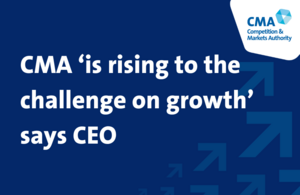CMA ‘is rising to the challenge on growth’ says CEO
The CMA should play a critical part in the success of the Government’s growth mission, CEO Sarah Cardell will say today.

In a keynote address to the Chatham House Competition Conference in London, the CEO of the Competition and Markets Authority (CMA), Sarah Cardell, will say that competition is an “engine for unlocking opportunities and growth” and an “essential lever in industrial strategy”, and that “as we focus on the critical part the CMA can play in the success of the growth mission, we must evolve but stay true to our mandate from Parliament: to promote competition, within and outside of the UK, for the benefit of consumers.
“We must unashamedly focus on the best outcomes for UK consumers, UK businesses and the UK economy; and always be open and transparent. We must deliver a regime that leaves no one in any doubt that the UK is open to business.”
Speaking on how competition should be a core component of the Government’s Industrial Strategy, Sarah will say:
“An industrial strategy which creates and captures maximum long-term value for the UK must be one in which competition is a core component.
“Putting competition at the core of industrial strategy can support the government’s objectives in two ways:
- First, effective competition drives growth directly in key sectors, removing barriers which stifle the flow of capital, innovation and the scaling of businesses;
- Second, when government itself acts to drive growth in particular sectors, pro-competitive principles can maximise the long-term impact of those interventions across the economy, whilst minimising the risk of unintended consequences.”
Speaking on how competition supports investment, Sarah will say:
“A dynamic economy, which rewards innovation and productivity, is a magnet for entrepreneurs with a keen eye for opportunities to found and grow businesses, and for the investors which back them.” While “barriers to effective competition - anticompetitive practices, high barriers to entry and so on - can deter investment.”
“But we take seriously any concerns that the way in which the regime is applied could chill investment. Our engagement to date with stakeholders often reveals these concerns to be more based in perception than reality. Even so, we know perceptions matter, and we must act to address this.”
On how the CMA will continue to progress and evolve, Sarah will reinforce the importance of pace and proportionality in merger reviews and outlined plans for a review of the CMA’s approach to remedies.
“We want to make sure that every business coming out of a UK merger review feels that they have been treated fairly and consistently, regardless of the outcome.
“And we know that two key areas of feedback are around pace and proportionality. A critical element to delivering both is how the mergers remedies regime operates.
“We’ve already started to address this through the phase 2 reforms.
“But as those reforms bed in, the logical next step is a more focused review of our approach to merger remedies.
“The goal for merger control is simple - and this has always been the case: every deal that is capable of being cleared either unconditionally or with effective remedies should be. Only a truly problematic merger, where the harm to businesses and consumers cannot be effectively addressed through remedies, should not proceed.
“Today I’m announcing the launch, in the New Year, of a review of our approach to mergers remedies. Amongst other issues, the review will cover:
-
when behavioural remedies may be appropriate (including any distinction for regulated sectors);
-
the scope for remedies that lock in genuine rivalry-enhancing efficiencies; and
-
the role for remedies to preserve relevant customer benefits which may offset anti-competitive effects;
-
building on the phase 2 reforms, we will also consider how we move to effective remedy discussions as quickly as possible, informed by a clear understanding of our potential competition concerns and a sound appreciation of the commercial reality of the parties’ business operations.”
Finally, Sarah will set out how the CMA would enhance its engagement with business and stakeholders.
“We will further enhance our engagement with the business, investment and start-up communities. In the last year, we’ve engaged with a greater range of stakeholders than ever before.
“But we are particularly keen to hear more from the investment community and from the UK’s vibrant start-up community. So, I am pleased to announce the launch of a new CMA outreach series for investors and startups, with a particular focus on mergers. I hope this will help us continue to learn from these communities, whilst further strengthening their understanding of and confidence in the CMA and our work.”
Notes to Editors:
- A livestream link to watch Sarah deliver her keynote speech at the Chatham House Competition Policy Conference 2024 is available on Youtube.
- Sarah’s full speech to the Chatham House Competition Policy Conference is available to read online, and the CMA has published its response to the Government’s Industrial Strategy Paper.
- For media enquiries, contact the CMA press office on 020 3738 6460 or press@cma.gov.uk.